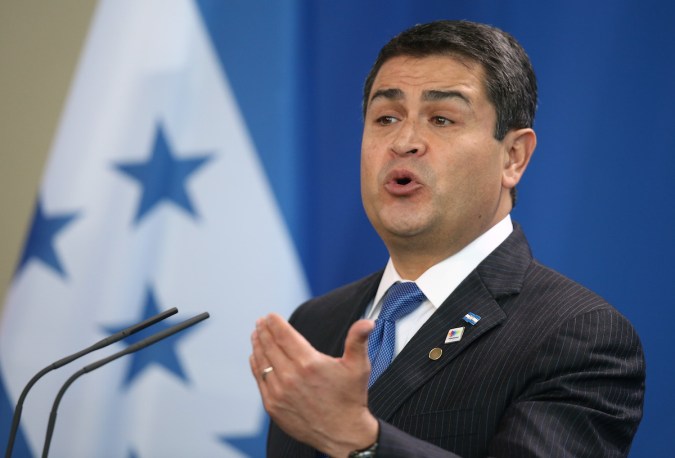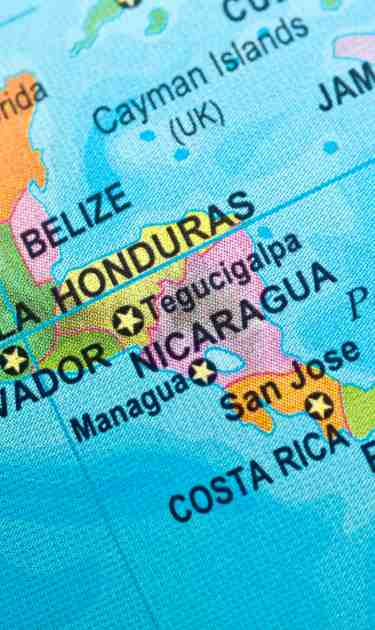In a matter of days, President Donald Trump went from tweeting lies about the motives of a group of Central Americans traveling to Mexico and the United States in a caravan to signing a proclamation to bring the National Guard to the border. It was a clear tactic to intimidate this group, and in some cases, it worked. Some set their sights on different locations. Others turned around and went back home. But for 28-year-old Cindy and 27-year-old Nikolle – and many others – this isn’t an option. They both want to reach the United States, because for them, there’s nothing but anguish left in Honduras. The caravan is giving them renewed hope.
“The truth is that I don’t expect to return to my country to once again suffer what I suffered.”
“Many people returned, maybe not to their countries, but to Guatemala, to Tapachula, to places here in Mexico. Others hope to stay here in Mexico City, ” Cindy – who is traveling with her husband and two children – tells me from Puebla, where the caravan stopped on Saturday. “But for me, no. The truth is that I don’t expect to return to my country to once again suffer what I suffered – seeing how they looted things from my house, seeing how they stole the little bit of money I saved, seeing how they threatened my kids and [how they looked at them], spending up to five days in a hospital so that someone could see me. No, I don’t expect to return to suffer through that. I am looking for a better life for them. And if I’m forced to return to my country, well, I’d rather die in the attempt [to leave] and not give up.”
For about two weeks, more than a thousand Central Americans – mostly from Honduras – have traveled in the caravan organized by Pueblos Sin Fronteras looking to reaching parts of Mexico and the United States. Though gang violence has plagued Honduras and the rest of the Northern Triangle for years, Honduras finds itself in the midst of political upheaval. At the end of 2017, Juan Orlando Hernández claimed victory over Salvador Nasralla, whose sizable lead in the election quickly – and, in the eyes of many, suspiciously – dissipated. In Honduras, re-election for the presidency only became possible after JOH essentially gamed the system – as the president of the Honduran Congress, he replaced four members of the Supreme Court with judges loyal to him who voted to remove the term limit.

Since then, Cindy had seen a drop in quality of life. She couldn’t enroll her children into school and she lost her job. And once gang members told her that she had to pay them so that they could play safely outside, she knew she could no longer stay. So she, her husband, and children left home – not quite sure where to go. They endured hunger and slept on the streets. It was a difficult time. They eventually reached Tapachula, Mexico, where they heard about the caravan. After learning about PSF’s work, they decided to join. “Thanks to them, we haven’t wanted for anything,” she says.
The caravan has occurred in some form for the past 15 years. Though it’s seen as largely symbolic – a way to draw attention to the plight of Central American immigrants – this year saw an increase in participants. It also caught President Donald Trump’s attention, and that’s when the lies started. Trump has accused the participants of trying to come to the United States to benefit from Deferred Action for Childhood Arrivals (DACA) – a program not available to them – and that women were being raped at high levels during the caravan.
“We are looking for a better life for our children and for ourselves.. We are not bad people.”
But Cindy – who aims to reach Colorado where she has family – dismisses what Trump has told the media. “It’s true that we are migrants. But we didn’t do it because we wanted to, but because circumstances forced us to,” she says. “And he should open his heart and the doors, because we’re not coming to ask for anything. We are hardworking people, fighters. We are looking for a better life for our children and for ourselves, and he should be more aware. We are not bad people.”
She reiterates that she’s only had positive experiences as part of the caravan and that she believes she’d be worst off if she didn’t have its help.
Nikolle, for her part, says that while traveling for large periods of time on foot underneath the sun is difficult, the caravan is a supportive space. “It encourages you [to keep going,]” she says. Nikolle is a transgender woman from Honduras. She left her home, because she wasn’t free to be herself. She received threats because of her gender identity. And she is now attempting to reach Tennessee, where she has a friend. Honduras is one of the deadliest places for transgender individuals, according to a Transgender Europe survey.
Much like Cindy, she ended up in Tapachula, where she heard rumors of the caravan. And though she’s also seen some change their plans after Trump’s comments, she intends to keep traveling north. She knows that even if she gets to the United States, some will continue viewing her in a negative light. But her friend who’s already in the United States, is, to her, an example of the spirit of immigrants and of their importance.
Though there’s much uncertainty in her life, she’s sure of one thing: “I am Nikolle…,” she says. “I am a very social person and a fighter. We’re going to give it our all and see how far that will take us.”




